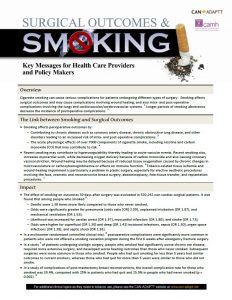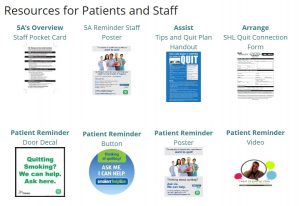HOSPITAL
Impact of interventions on tobacco use morbidity and mortality
Illness can motivate tobacco users to make a quit attempt. Hospitalization presents a unique opportunity for tobacco cessation treatment across disciplines within a hospital and hospital interventions have been shown to help patients remain abstinent in the long term.
Evidence to support hospital tobacco dependence interventions
There are multiple competing priorities facing Ontario hospitals. In order to gain leadership support for the integration of tobacco dependence interventions into hospital practices it is important to incorporate evidence into planning tools and discussions with decision makers.
Hospital initiated tobacco dependence interventions improve successful quit rates and contribute to reductions in hospitalizations, morbidity and mortality.
- Interventions for Smoking Cessation in Hospitalised Patients – Article
- Declines in Acute Myocardial Infarction after Smoke-free Laws and Individual Risk – Article abstract
- Ottawa Model for Smoking Cessation – Reference list
- Smoking Cessation Initiated During Hospital Stay for Patients with Coronary Artery Disease: a Randomized Controlled Trial – Article
Examples of evidence-based practice systems
Why start from scratch when there are evidence-based program examples and tools which already exist to help you move your project forward. These programs include a variety of models/frameworks, templates, tools, and resources to help you plan, implement and evaluate your program. Contact the programs directly for more information or resources.
Ottawa Model for Smoking Cessation (OMSC) -The University of Ottawa Heart Institute
Since 2006, the University of Ottawa Heart Institute has assisted healthcare organizations to implement smoking cessation into routine clinical care. The six phases include plans and tools to help hospital staff to integrate the OMSC into their own unique practice settings. The phases include:
- Program introduction and buy-in
- Pre-implementation evaluation;
- Institutional tobacco control protocol development;
- Physician, nurse and other health professional training;
- Program launch; and
- Post-implementation evaluation and quality improvement.
Contact OMSC@ottawaheart.ca to sign up and receive the OMSC support documents to assist your hospital to implement comprehensive tobacco cessation into practice.
Implementing an inpatient smoking cessation program – Dr. Patricia Smith, Northern Ontario School of Medicine
A step-by-step manual for implementing a cost-effective tobacco cessation program for hospitalized patients. Based on the Staying Free program, which has evidenced among the highest cessation rates reported in the scientific literature, this book is the result of decades of research by the authors. The tobacco cessation process is applicable to most behavioral interventions in acute- or long-term care settings. This program is used at the Thunder Bay Regional Health Sciences Centre.
Hospital Demonstration Projects – Ministry of Health and Long-term Care (MOHLTC)
Fourteen hospitals across Ontario are developing and implementing an evidence-based smoking cessation intervention targeting patients with chronic diseases. These hospitals are located within 10 of the 14 Local Health Integration Networks (LHINs) and represent diverse hospital types (community hospitals, ambulatory care hospitals, teaching hospitals, rehabilitation centres, and mental health hospitals). Smoking cessation interventions incorporate the “5 A’s for Smoking Cessation” (ask, advise, assess, assist, and arrange) and facilitate patients’ access to community resources after discharge from hospital to ensure ongoing cessation support.These Hospital-Initiated Smoking Cessation Demonstration Projects are being independently evaluated to identify promising practices and lessons learned. As part of these demonstration projects, a Joint Capacity Building Working Group for Hospital-Initiated Cessation was struck to develop an evidence-based system pathway and toolkit to assist hospitals plan, implement and sustain a smoking cessation program. The Unified Model for Hospital-Initiated Smoking Cessation Programs Toolkit remains a living document and is currently being utilized by demonstration project sites. Once finalized, the toolkit will be disseminated more broadly.
Best Practice Spotlight Organizations – Registered Nurses Association of Ontario (RNAO)
Interested hospitals can choose to implement RNAO’s smoking cessation guideline “Integrating Smoking Cessation into Daily Nursing Practice” as one of their selected guidelines under the Best Practice Spotlight Organization Program.
Smoking Cessation Framework – Cancer Care Ontario – Regional Cancer Centres
All Regional Cancer Centres are required to implement the smoking cessation framework which utilizes the 5 As evidence-based smoking cessation intervention (ask, advise, assess, assist, arrange) to target ambulatory cancer patients seen in Regional Cancer Centres.
This resource documents the lessons learned from the implementation of tobacco-free clinical and outdoor grounds policies in hospital settings. Specific examples from three hospitals are highlighted: 1) North Bay Regional Health Centre; 2) Ross Memorial Hospital; and 3) Sault Area Hospital.
Communicating with staff and the public. A key messages and question and answer document.
This document is useful for hospital staff that are developing communication materials on smoke-free clinical and grounds policies for staff and the general public. Contact the Program Training and Consultation Centre (PTCC) to access a copy at 1-800-363-7822 or admin@ptcc-cfc.on.ca
Examples of Hospital Clinical Practice Systems Protocols
- West Lincoln Memorial Hospital – Smoking Cessation Clinical Protocol for Inpatients
- Hamilton Health Sciences Tobacco Cessation Program
- Brant Community Healthcare System:
- Grand River Hospital – Tobacco Withdrawal Management policy
Examples of Hospital Tobacco-Free Outdoor Policies and Procedures
- Brant Community Healthcare System Smoke-free and Tobacco-free Property Policy
- Grand River Hospital
Examples of patient assessment and pharmacotherapy tools
Assessment and pharmacotherapy tools exist to help you support your clients to quit tobacco use.
Patient Assessment Forms and Nicotine Replacement Therapy (NRT) Order Sets
- Hamilton Health Sciences Adult NRT Order Set
- Hamilton Health Sciences Physician Guidelines for the Titration of NRT
- Tobacco Cessation Pharmacotherapy Comparison Chart
- Brant Community Healthcare System – Tobacco Cessation and Nicotine Replacement Therapy Protocol
- Grand River Hospital
- Free stop smoking medications are available in Ontario
Resources for hospital staff and patients
Resources Tailored for Hospital Patients and Staff:
Available for download. Contact your local Public Health Unit or Smokers’ Helpline for requests to adapt resources.
Training opportunities for hospital staff
Healthcare providers are considered a credible source of information by patients – you can help your patients to quit smoking, even with just a few minutes of your time.
- Training opportunities for brief contact intervention with clients, as well more intensive interventions are available.
- University of Ottawa Heart Institute – Ottawa Model for Smoking Cessation
- Registered Nurses Association of Ontario (RNAO) Tobacco-Free RNAO is a comprehensive initiative designed to support nurses and other health care providers to implement the RNAO’s best practice guideline (BPG) for smoking cessation “Integrating Smoking Cessation into Daily Nursing Practice.”
- Knowledge exchange (e.g. webinars, online community)
- E-training modules
Monitoring and evaluation
- Ontario Tobacco Research Unit (2011) Smoking cessation activities in Ontario hospitals: survey results 74% of Hospitals responded to the survey (165/224). Compare your hospital to hospital based cessation services, practices and policies in Ontario hospitals.
- Ontario Tobacco Research Unit (August 2013). Data Standards for Smoke-free Ontario Smoking Cessation Service Providers With a range of smoking cessation services happening in Ontario, there is a need for common measures and definitions to ensure equivalent reporting by service providers. Key data standards and definitions are provided in this document for adult (18 years of age and older) tobacco users participating in smoking cessation programs. You can utilize these data standards/questions and definitions when creating your patient assessment forms.
- Registered Nurses Association Best Practice Guideline for Smoking Cessation – Evaluation Toolkit (hospital or clinic setting)
- Templates
- Chart audits questions
- In-hospital questions
- Post discharge follow-up interview questions
- University of Ottawa Heart Institute–Ottawa Model for Smoking Cessation.
- See sections 2 (Pre-implementation evaluation) and 6 (Post-implementation evaluation and quality improvement).






